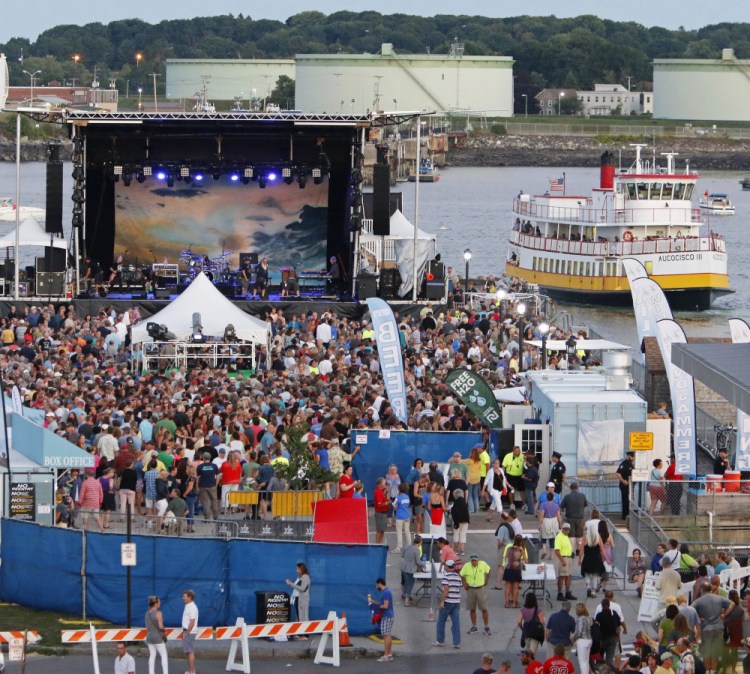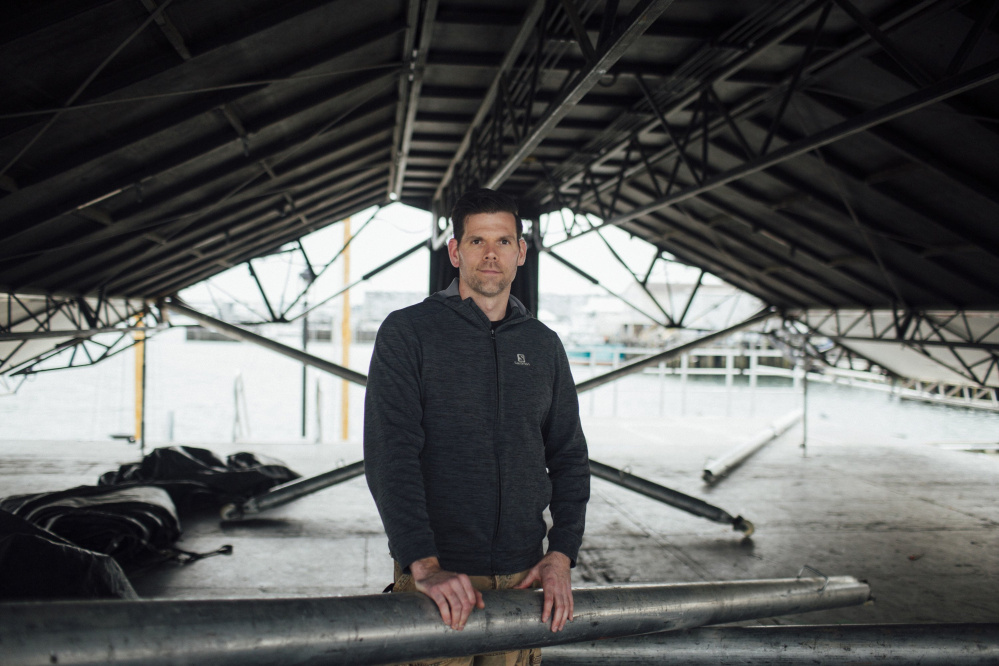The Portland City Council on Monday will take up Waterfront Concerts’ request to continue its concert series on the Maine State Pier, which generated complaints from people in Portland, South Portland and Falmouth during the last concert season.
The series, which approached 30 shows in each of the past two years, is a big hit with fans, drawing more than 50,000 people to the Portland waterfront and surrounding businesses. However, some longtime residents in the East End say the concerts are adversely affecting their quality of life.
“There are a lot of emails coming in,” said City Councilor Belinda Ray, whose district includes the East End and the state pier. “There are a lot of people who are dissatisfied with the level of noise with last year’s concerts and the frequency of those concerts.”
The council likely will meet in January to discuss whether the concerts should continue at the pier, and if so, what type of accommodations should be made. That is likely to renew a broader discussion about the future of the Maine State Pier, the Portland Ocean Terminal and adjacent city-owned land.
Last year, the council approved a special permit that would allow Bangor-based concert promoter Waterfront Concerts to book shows at the city-owned pier without seeking approval for each concert. That type of arrangement is necessary because national acts typically play in Portland or Bangor in between stops on their regular tours, the promoter said.
The city has received about $100,000 in fees from the concerts in each of the past two years.
City Manager Jon Jennings said the proposal to be presented to the council Monday will be the same as last year. However, the staff will be more sensitive to the frequency of shows.
“We have had staff conversations with Waterfront Concerts about noise and about the frequency of some concerts,” Jennings said, pointing to one busy stretch of nine shows in 10 days last year. “That’s not something we can permit going forward. Those need to be scattered out.”
Waterfront Concerts founder Alex Gray said he doesn’t anticipate another stretch like that.
“I think of that as somewhat of an anomaly,” he said. “It’s unlikely that happens again in our history. That was hard on the staff and I wouldn’t try to do that again.”
Gray said next year he plans on requiring bands to use a new $750,000 sound system that allows sound engineers to focus the sound on the crowd. Last year, some bands chose not to use that system, leading to sound complaints, he said.
He also is interested in partnering with the city to establish fixed-point sound monitoring that would record sound levels in real time, allowing the city to get a better understanding of ambient noise as well as the true impact of the concerts.
Event workers regularly monitor decibel levels at the venue, as well as in response to complaints. An analysis by the Portland Press Herald revealed that the decibel levels were basically the same in 2016 as they were in 2015, and that the loudest shows in terms of decibel levels didn’t always generate the most complaints.
As of mid-August, the number of complaints received by the police department’s nonemergency dispatch number were down from the 36 received over the same period in 2015. By the end of the 2016 season, the number of complaints reached 45, surpassing the 2015 level, according to a city analysis. Most of the complaints were made on Thursday nights. Concerts during August and September produced 17 complaints and 13 complaints, respectively.
The noise issues also are a problem for some residents across the Fore River in South Portland, said interim City Manager Don Gerrish. He has forwarded about a half-dozen complaints, mostly from Ferry Village, about the concert noise.
“We passed those along to Portland so they could see it wasn’t just their residents (complaining). The way we are situated, the noise does travel to South Portland,” Gerrish said. “I think at this point, we trust Portland to take a look at it and do the appropriate things to deal with the issue.”
Meanwhile, Portland resident Karen Snyder said she submitted a petition with 35 signatures telling the council that the concerts are harming the quality of life for people in Portland, Peaks Island, South Portland and elsewhere.
“When you’re in your house and you can’t have the windows open and can’t go to bed – that’s intrusive to your quality of life,” said Snyder, who lives on Waterville Street on Munjoy Hill.
In an email to councilors, Snyder suggests moving the concerts to Merrill Auditorium or Thompson’s Point in Libbytown, a privately owned venue that puts on its own concert series. She also recommends that the city amend its noise ordinance to address the reverberation of sound in addition to volume.
Thomas Woodruff said he can occasionally hear the concerts from his home on Greenway Drive in Falmouth. He signed Snyder’s petition even though he doesn’t consider the sound a nuisance.
“I signed it in sympathy for people who live closer,” Woodruff said. “I can only imagine what it’s like if you live on Munjoy Hill or across the river in South Portland. It must be pretty loud.”
Waterfront Concerts is interested in building a more permanent music venue at the pier, possibly adding a cover that would dampen the sound and accommodate more events. But that investment would hinge on a larger community discussion about the future of the pier.
“We want to know what the community wants,” Gray said. “We want to know what the council wants.”
The council’s Economic Development Committee had planned on taking up the topic in 2016, but it barely progressed beyond a preliminary discussion.
“I think we have to look at it as an entire package,” said Mayor Ethan Strimling. “I hope the Economic Development Committee will really take it up this year.”
Meanwhile, Ray also is interested developing a clear, centralized process for reporting and tracking sound complaints, which are currently sent to police, elected officials and reported online. She said both the promoter and the city need to funnel the complaints to police, so they can be responded to and tracked.
Ray also is interested in expanding the city’s noise ordinance, which currently only applies to the downtown area. “No matter where you live in the city you should be able to enjoy your home and have a certain quality of life,” she said.
Concert noise is among the growing list of disruptions on the city’s East End. Over the past few years, longtime residents have watched as the council has relaxed zoning rules to encourage more housing development in the densely packed neighborhood. Munjoy Hill, as well as the India Street and East Bayside neighborhoods, are seeing the heaviest development activity in the city.
And with development comes the noise of construction.
“We’re just getting accosted. It’s just too much,” Snyder said. “There’s a lot of frustration out there.”
Send questions/comments to the editors.





Success. Please wait for the page to reload. If the page does not reload within 5 seconds, please refresh the page.
Enter your email and password to access comments.
Hi, to comment on stories you must . This profile is in addition to your subscription and website login.
Already have a commenting profile? .
Invalid username/password.
Please check your email to confirm and complete your registration.
Only subscribers are eligible to post comments. Please subscribe or login first for digital access. Here’s why.
Use the form below to reset your password. When you've submitted your account email, we will send an email with a reset code.